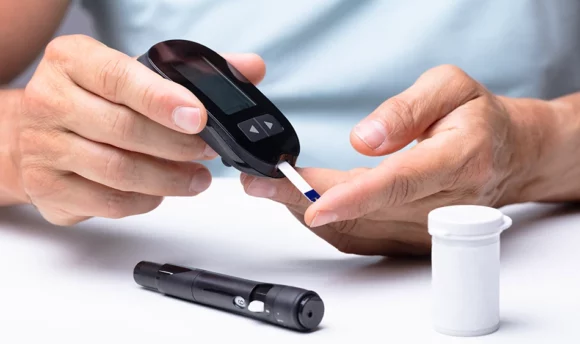Is Keto Bad for Your Heart? How to Limit the Cardiovascular Risks
Can the keto diet improve our cardiovascular health, or does it cause heart disease? We explain how keto works and the risks you should consider when switching to this diet.

Known for its ability to aid weight loss, control blood sugar, and boost energy, keto is a highly popular diet for those wanting to improve their overall well-being.
However, this low-carb diet has recently been linked to declining cardiovascular health, with research revealing that it may increase the risk of heart disease. But is this true or simply speculation?
Keep reading to discover the link between keto and heart disease and how you can maintain good health while on the diet.
Is Keto Bad for Your Heart? Here’s What the Science Says
Switching to a low-carbohydrate, high-fat diet such as keto can increase your risk of having several major cardiovascular events, including heart attacks, strokes, angina (chest pain), or blocked arteries.
Researchers conducting the observational study also found that the keto diet may increase levels of low-density lipoprotein (LDL) in the body, which is considered to be “bad cholesterol.”
Those on the diet tend to struggle with hitting their fiber goals while eating high amounts of saturated fat, both of which contribute to high LDL cholesterol and worsening heart health.
This is particularly the case for followers of dirty keto. As opposed to the clean keto diet, dirty keto allows those following it to eat more highly processed foods and unhealthy fats to meet their macronutrient goals. You’re likely to try dirty keto if you want to lose weight but are less concerned with the quality of your food intake.
To prevent this, the American Heart Association recommends that you get no more than 5–6% of your calories from saturated fat.
How Does the Keto Diet Work?
Starting the keto diet requires followers to restrict their intake of carbohydrates, which the body usually uses for fuel. Instead, it begins burning its own stored fat, converting it into ketones to use as energy.
Known as ketosis, this process helps people to lose weight, manage their blood sugar, and stabilize their energy levels.
As a rough guide, it’s recommended to get 70–80% of your daily calories from fat, 10–20% from protein, and 5–10% from carbs to remain in ketosis.
Benefits of the keto diet
Choosing a high-fat, low-carb diet has several possible advantages for your health. Some of the potential health benefits of keto are that it:
- Helps with weight loss
- May reduce appetite
- Lowers blood sugar levels for a reduced risk of diabetes
- Lowers triglycerides, a type of fat in the blood
- Higher levels of high-density lipoproteins (HDLs), or “good” cholesterol
- Increases energy levels
- Protects brain function
- Reduces the risk of cancer
Risks of the keto diet
Along with potentially damaging your heart health, there are some other risks to consider if you’re thinking about trying the keto diet. For example, it isn’t safe for those with health conditions that involve the thyroid, liver, pancreas, or gallbladder.
Below are some of the other things to think about before switching to this low-carb diet:
- Seen as restrictive by some
- Can be difficult to maintain for long periods
- Its long-term impacts remain unclear
- Can lead to nutrient deficiencies
- Has been linked to hair loss
- May cause an irregular menstrual cycle
- Could result in digestive issues
What’s the Link Between the Keto Diet and Heart Disease?
High-fat keto diets encourage inflammation and LDL cholesterol levels to rise in the body, which are both key factors in regulating heart health and disease.
The keto diet encourages followers to consume higher-than-average amounts of fat. Unlike the clean keto diet, there are few rules regarding the types of foods you should consume to hit your fat goals.
This means that people often turn to processed foods and animal products, which contain unhealthy saturated and trans fats. These foods are also often high in cholesterol too, so choosing them over a long period causes levels of bad LDL cholesterol to rise.
Having large amounts of LDL in the blood can lead to peripheral arterial disease. This is the result of plaque build-up, causing your arteries to become narrowed or blocked. You’re, therefore, more likely to suffer from cardiovascular disease.
The lack of carbohydrates eaten on a ketogenic diet also means that you’ll struggle to meet the daily recommended fiber intake of 22–34g per day, depending on your age and gender.
Fiber is a carb that plays an important role in lowering both high blood pressure and cholesterol, which reduces your risk of developing heart disease, diabetes, or of having a stroke.
How to Prevent Heart Disease on Keto
Whether you’re concerned about your cardiovascular health or are already a heart patient, there are some things that you can do to reduce your risk of high cholesterol, stroke, heart attack, and heart disease.
Studies show that replacing saturated fats with healthier mono and polyunsaturated fats can reduce the risk of heart disease. Try to eat less processed foods, as these are typically high in saturated and trans fats, which will increase your cholesterol. As we’ve mentioned, they can also increase inflammation in the body.
For example, swap out processed red meats like hot dogs, salami, and bacon for lean, high-protein meats such as chicken breast and turkey.
You could try the pescatarian keto diet, which prioritizes fish over meat as the main source of nutrients. Seafood contains high amounts of omega-3 fatty acids, which contribute to lowering bad LDL while increasing good HDL.
It may also be beneficial to replace animal foods with plant-based alternatives, as the latter tend to contain more healthy fats. Choose olive oil over butter or lard, and try to eat more tofu, avocado, eggs, and low-carb vegetables, which are also a great source of fiber on keto.
Some other lifestyle changes that you can make to protect your heart health on the ketogenic include:
- Quitting smoking
- Getting more sleep
- Reducing alcohol intake
- Implementing a regular exercise routine
FAQs
There is no evidence to suggest that keto pills, which can be used alone or alongside following the keto diet, are not safe to be taken by those with heart conditions. However, you should consult your doctor before taking any new medications or supplements, as they may interact with your current medication and cause dangerous side effects.
Try to reduce your consumption of animal products and processed foods, as they are more likely to contain saturated and trans fats that can increase inflammation and cholesterol. Instead, choose fish and plant-based foods that contain healthy fats, such as salmon, tuna, olive oil, chia seeds, and walnuts.
Following the ketogenic diet may increase your risk of heart disease, stroke, or heart attack. This is because it can raise your bad LDL cholesterol levels, which is a risk factor for heart attacks.
A Word From a Nutritionist
The keto diet has several positive short-term effects on your health, including helping with weight loss, controlling your blood sugar levels, and even boosting good HDL cholesterol levels. However, following a keto diet also comes with other risk factors for your heart health.
If you’re hoping to lose weight or boost your overall well-being, but are worried about any long-term heart problems you may develop, then try to eat foods that are low in saturated fats yet high in healthy omega-3 fatty acids.
Alternatively, you could try a higher-carb option like a vegan or the Mediterranean diet. These diets don’t rely on fats for most of your nutrition, so you’re less likely to consume large amounts of unhealthy saturated fats.
As with any new diet, consult your doctor before switching to keto. They can advise you on whether this diet is suitable, as it should be avoided by those who have conditions involving the pancreas, liver, thyroid, or gallbladder.
Doctors will also monitor your cholesterol levels and other risk factors to ensure that you don’t develop serious heart problems.
Conclusion
There is evidence to suggest that following the keto diet for long periods of time can increase levels of bad LDL cholesterol in the body. This makes it more likely for you to develop cardiovascular problems, including heart disease, heart attack, angina, or blocked arteries.
To keep your heart healthy while on this diet, minimize your consumption of saturated and trans fats, and replace them with healthy unsaturated fats and animal-based foods. If you are a heart patient or are worried about the risks of keto, consult your doctor before starting any low-carb diet.

















































 Select your language:
Select your language: 








